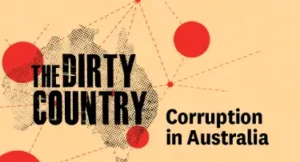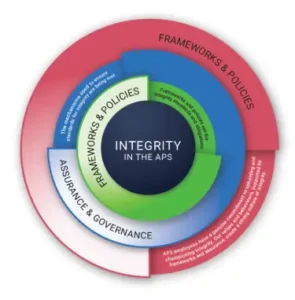Description: Big Four Accounting Corruption
Uncover the influence of the Big Four accounting corruption on Australian government and their impact on public spending. Demand action against corruption now!
Introduction: The Expanding Influence of the Big Four in Australian Governance
In recent years, the Big Four accounting firms—EY, Deloitte, KPMG, and PwC—have secured an influential role in Australian governance through extensive contracts for consulting services, auditing government departments, and advising on major policy decisions.
While their specialized ability is valuable, this growing dependence raises concerns about potential corruption and the efficient use of public funds. A robust and independent public service could mitigate the need for such external consultancy, ensuring decisions are made with public interest as the primary focus, rather than profit-driven motives.
The Growing Concern Over Big Four’s Practices
The practices of the Big Four accounting firms—PwC, Deloitte, EY, and KPMG—have come under increasing scrutiny due to their pervasive influence in public sector governance and their questionable ethical practices.
As watchdogs like the Centre for Public Integrity have highlighted, these firms often run in ways that undermine transparency, accountability, and fairness, raising concerns about their role in public procurement and decision-making.
Questionable Contracting and Overcharging
The Big Four have been criticized for their dominance in securing public sector contracts, often through non-transparent processes that sidestep competitive tendering. The lack of competitive tendering in awarding contracts to these firms has fuelled allegations of favouritism and inefficiency.
Without a transparent bidding process, government agencies risk paying inflated fees for services that may not be the best value for taxpayers. Such practices undermine the principle of fair competition and limit opportunities for smaller, independent firms to compete for government work.
Additionally, these firms often charge exorbitant fees for their services, often far exceeding the costs associated with similar work performed by public servants or smaller consultancies. Critics argue that the high fees strain public budgets, diverting funds that could be given to critical areas such as healthcare, education, and infrastructure.
For example, instances of consultants billing millions for work that could have been managed internally highlight inefficiencies and a lack of due diligence in ensuring cost-effectiveness. The over-reliance on the Big Four for advice, audits, and strategy undermines the government’s ability to develop internal expertise and self-reliance.
Scandals and Misuse of Power: Big Four Accounting Corruption
The Big Four’s deep integration into public governance has been accompanied by controversial scandals and allegations of misconduct, raising significant questions about their ethical practices and accountability.
1. Misuse of Confidential Data: One of the most alarming issues involves the misuse of sensitive government data. In some cases, these firms have been accused of improperly using confidential information for competitive advantage, either for their own benefit or for that of private sector clients. For instance, whistleblower reports have revealed instances where data shared with the Big Four during consultancy projects was later used to shape strategies for private corporations, creating a conflict of interest. Such breaches not only violate trust but also jeopardize national security and public confidence in governance.
2. Misleading Advice and Poor Governance: The quality of advice provided by the Big Four has also been called into question. Reports have appeared of these firms delivering flawed or biased advice, leading to poor governmental decisions that favour private sector clients or ensure continued reliance on their services. In some cases, recommendations that aligned with the interests of large corporations have resulted in public policies that harm taxpayers, small businesses, or vulnerable communities. This dual role—recommending governments while also serving private sector clients—raises concerns about conflicts of interest and the impartiality of their counsel.
3. Revolving Door Practices: Another troubling practice is the “revolving door” phenomenon, where personnel move between high-ranking roles in the Big Four and government positions. This blurs the line between public service and private profit, creating opportunities for undue influence and preferential treatment in awarding contracts. Such practices erode public trust in the integrity of public institutions and foster beliefs of a system rigged in favour of powerful private entities.
4. Tax Avoidance Schemes: The Big Four have also faced criticism for their involvement in designing and promoting aggressive tax avoidance strategies for corporations and high-net-worth individuals, even as they recommend governments on tax policy. This contradictory behaviour further highlights the conflicts of interest inherent in their dual roles and raises ethical concerns about their commitment to public welfare.
Broader Implications and Reform
The dominance of the Big Four in public governance not only raises concerns about cost efficiency and ethics but also has broader implications for democratic accountability. Their growing influence risks creating a scenario where key decisions are outsourced to private entities with minimal oversight, undermining the ability of governments to act independently and in the public interest.
To address these concerns, there is an urgent need for systemic reforms in how governments engage with external consultancies. Recommendations include:
– Strengthening Transparency: Mandating open tender processes for all significant public sector contracts to ensure fair competition and cost-effectiveness.
– Enhancing Oversight: Setting up independent bodies to check and review the performance and ethical practices of external consultants. – Building Internal Capacity: Investing in the skills and resources of public servants to reduce reliance on external firms and enhance the government’s ability to manage complex projects in-house.
– Regulating Conflicts of Interest: Implementing stricter regulations to prevent conflicts of interest and ensuring a clear separation between consulting roles and policymaking.
By addressing these issues, governments can rebuild public trust, safeguard public funds, and ensure that decision-making processes are still accountable to the citizens they serve rather than the profit motives of private entities.
Addressing Corruption and Enhancing Public Sector Integrity
Government Initiatives to Curtail Corruption
The government needs to take decisive steps to address these growing concerns:

– Transparent Tender Processes: By implementing stringent tendering processes that ensure transparency and fairness, the government can mitigate the risks of favouritism and corruption.
– Regulating Consulting Fees: Setting up guidelines for reasonable consulting fees can help prevent financial exploitation.
– Robust Monitoring Systems: Introducing advanced monitoring systems to oversee and audit government contracts and the use of public funds can ensure that these resources are used appropriately.
The Public’s Role in Safeguarding the Sector
The public also has a crucial role in supporting the integrity of the public sector:
– Vigilance and Reporting: Citizens should be encouraged to stay informed about how public funds are being used and to report any irregularities or suspected corruption.
– Supporting Anti-Corruption Initiatives: Public support for organizations that check, and fight corruption can lead to more robust enforcement of existing laws and the development of new anti-corruption legislation.
Restoring Public Service Expertise
Enhancing Internal Capabilities

Investing in the public sector’s own capabilities is essential to reduce dependence on external consultants:
– Training and Development: Enhancing the skills and knowledge of public servants through continuous professional development can diminish the need for external consultants.
– Innovation and Risk-Taking: Encouraging a culture of innovation within the public service can lead to more internally generated solutions, reducing reliance on the private sector.
Promoting Transparency and Collaboration
Creating an environment of openness and teamwork within the public service can lead to more effective governance:
– Transparency Standards: High standards of transparency can help ensure that public servants are accountable to the public.
– Collaborative Work Environments: Helping better collaboration among public servants can lead to more effective and efficient public service delivery.
Conclusion: A Call for Ethical Governance
The deepening involvement of the Big Four accounting firms in the Australian public sector is a double-edged sword, offering both valuable expertise and potential risks of corruption. It is imperative for both government and citizens to vigilantly oversee and regulate this involvement to ensure it helps the public good.
Call to Action: Demand Transparency and Integrity
What more can be done to ensure that public funds are managed ethically? How can we better regulate the influence of large accounting firms in public governance?
Take part in safeguarding our public sector. Share this article, discuss these issues with your peers, and push for reforms that ensure transparency and integrity in public governance.
References:
Shadow States: How consultants infiltrated government: https://www.abc.net.au/news/2023-08-07/shadow-state:-how-consultants-infiltrated/102699746
How the big four accounting firms infiltrated governments: https://publicintegrity.org.au/how-the-big-four-accounting-firms-infiltrated-governments-earning-more-than-10b-over-a-decade-while-taxpayers-are-in-the-dark/
A strong Australian Public Service benefits us all: https://ministers.dss.gov.au/editorial/12131

